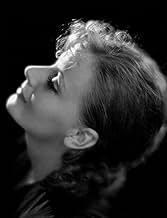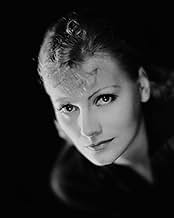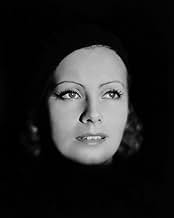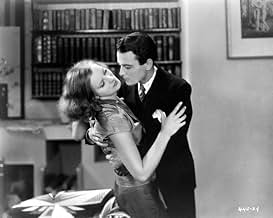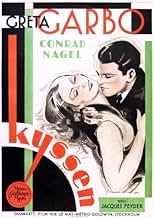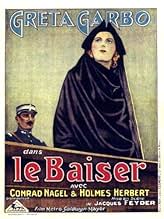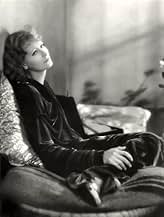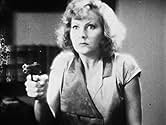IMDb रेटिंग
6.8/10
1.3 हज़ार
आपकी रेटिंग
अपनी भाषा में प्लॉट जोड़ेंAn unhappily married woman is caught up in scandal and murder when her affection toward a young man is misinterpreted.An unhappily married woman is caught up in scandal and murder when her affection toward a young man is misinterpreted.An unhappily married woman is caught up in scandal and murder when her affection toward a young man is misinterpreted.
- निर्देशक
- लेखक
- स्टार
Symona Boniface
- Gossip in Museum
- (बिना क्रेडिट के)
Allan Cavan
- Prison Warden
- (बिना क्रेडिट के)
André Cheron
- Prosecutor
- (बिना क्रेडिट के)
Carrie Daumery
- Party Guest
- (बिना क्रेडिट के)
Ruth Feldman
- Scrubwoman
- (बिना क्रेडिट के)
Lee Phelps
- Tour Guide
- (बिना क्रेडिट के)
Philip Sleeman
- Lounge Lizard
- (बिना क्रेडिट के)
फ़ीचर्ड समीक्षाएं
"The Kiss" happens about midway into the movie ... Greta Garbo gives young admirer Lew Ayres a friendly kiss goodbye as he's about to leave town, Ayres, who cannot control his infatuation with the beautiful Garbo, goes in for another, less platonic kiss, at which point Garbo's husband sees them from afar and goes berserk. A fight amongst the three ensues, gets carried into another room where the door is shut to us, the audience, and we hear a shot. Garbo's husband is dead, but who did it?
Prior to the "kiss" moment, we've seen Garbo and her lover (Conrad Nagel) in a torturous romance ... they both love each other madly but Greta doesn't see any way out of her loveless marriage. In the meantime, Lew Ayres follows Greta around like a puppy dog; he's an 18-year-old completely infatuated with the beautiful married lady.
The latter half of the movie deals with the investigation of the husband's death, Greta's arrest, and her trial where she is defended by Nagel who in addition to being her former lover is also a lawyer.
I won't give away the outcome of the trial, but I will say that the jury believes it is Person A who did it and after the trial we learn it was Person B.
The musical score to this flick was absolutely horrible. I especially could have done without the "Romeo and Juliet" theme that was played every time the flick wanted to telegraph Greta's and Conrad's love to the audience.
Despite the score, this was a very enjoyable silent movie. I find some silents tedious, others quite well done. "The Kiss" definitely falls into the latter category. Worth watching.
Prior to the "kiss" moment, we've seen Garbo and her lover (Conrad Nagel) in a torturous romance ... they both love each other madly but Greta doesn't see any way out of her loveless marriage. In the meantime, Lew Ayres follows Greta around like a puppy dog; he's an 18-year-old completely infatuated with the beautiful married lady.
The latter half of the movie deals with the investigation of the husband's death, Greta's arrest, and her trial where she is defended by Nagel who in addition to being her former lover is also a lawyer.
I won't give away the outcome of the trial, but I will say that the jury believes it is Person A who did it and after the trial we learn it was Person B.
The musical score to this flick was absolutely horrible. I especially could have done without the "Romeo and Juliet" theme that was played every time the flick wanted to telegraph Greta's and Conrad's love to the audience.
Despite the score, this was a very enjoyable silent movie. I find some silents tedious, others quite well done. "The Kiss" definitely falls into the latter category. Worth watching.
I've got to admit up front that I have long felt that Greta Garbo was a bit overrated as an actress. All too often, she was stuck in super-melodramatic films involving either adultery or with Garbo playing an irresistible "super-vamp". While the public loved this persona, the films seemed quite derivative and clichéd. There are only so many films like this you can watch until they blend together.
Fortunately, she also made some dandy films like NINOTCHKA, QUEEN Christina and THE KISS. While superficially the film seems just like another adultery film, Garbo was given better material--as she was a woman who WANTED to commit adultery but couldn't bring herself to cheat on her much older husband. I'm glad the film didn't pursue this expected plot line but instead the film is about the consequences when the husband THINKS she's cheating on him when she isn't. This led to a dandy finale where there is a nice plot twist.
Overall, this film excelled because Garbo did NOT stare in a pained way into space as she so often did in films where she played a married woman trapped in a loveless marriage. Here, she plays a more believable and well-rounded personality--someone who seemed much more human than the usual Garbo character.
With good production values and only one minor problem (a repetitive and sappy soundtrack), this is well worth a look.
Fortunately, she also made some dandy films like NINOTCHKA, QUEEN Christina and THE KISS. While superficially the film seems just like another adultery film, Garbo was given better material--as she was a woman who WANTED to commit adultery but couldn't bring herself to cheat on her much older husband. I'm glad the film didn't pursue this expected plot line but instead the film is about the consequences when the husband THINKS she's cheating on him when she isn't. This led to a dandy finale where there is a nice plot twist.
Overall, this film excelled because Garbo did NOT stare in a pained way into space as she so often did in films where she played a married woman trapped in a loveless marriage. Here, she plays a more believable and well-rounded personality--someone who seemed much more human than the usual Garbo character.
With good production values and only one minor problem (a repetitive and sappy soundtrack), this is well worth a look.
"The Kiss" has a fairly predictable plot, but interesting acting from the excellent cast keeps you watching on this one. As others wrote, the Vitaphone soundtrack here was pretty poor, except for one section; all the melodies have been used before in many silent films. Listening to classical Tchaikovsky is not really appropriate for a modern film like "The Kiss."
Greta has some great closeups in this film, but in certain sections seems to be sleepwalking through her role. Conrad Nagel was a delight to watch, he always seemed much more handsome on screen than in his still photos. He is the hero in this film, if the film could really be said to have a hero after everyone lies in court.
Lew Ayres was adorable, and had to have made a great impression on studio bosses when the film was first released, for he went straight from this film into his classic "All Quiet On The Western Front", which made him a star. Holmes Herbert, so good in Pola Negri's "A Woman of the World", here is aged with makeup and plays Lew Ayres' father convincingly. Anders Randolf was a bit jarring as Greta's husband, but his performance was fine too.
The print was decent on this MGM release, compared to another Garbo feature, "The Single Standard", made earlier. But of both films, "The Single Standard" is by far the superior film technically, plot-wise, and in its performances, though its print is more worn.
Greta has some great closeups in this film, but in certain sections seems to be sleepwalking through her role. Conrad Nagel was a delight to watch, he always seemed much more handsome on screen than in his still photos. He is the hero in this film, if the film could really be said to have a hero after everyone lies in court.
Lew Ayres was adorable, and had to have made a great impression on studio bosses when the film was first released, for he went straight from this film into his classic "All Quiet On The Western Front", which made him a star. Holmes Herbert, so good in Pola Negri's "A Woman of the World", here is aged with makeup and plays Lew Ayres' father convincingly. Anders Randolf was a bit jarring as Greta's husband, but his performance was fine too.
The print was decent on this MGM release, compared to another Garbo feature, "The Single Standard", made earlier. But of both films, "The Single Standard" is by far the superior film technically, plot-wise, and in its performances, though its print is more worn.
As a fan of Greta Garbo films, I consider each one of them highly entertaining and worth seeking out. The Swedish beauty could captivate the viewer in many of her roles to such extend that she was as popular in movie world as, much later, the Swedish band ABBA was in music world. Yet, when I talk to people who are quite knowledgeable about the early cinema, I usually encounter the opinion that Garbo films let them down. "She was such a dramatic lady," they say "she can still make us cry."
Strange as it may occur, to some extend, this pretentious opinion may be found accurate, particularly when we consider the year 1939 and Garbo's first comedy NINOTCHKA made by Ernst Lubitsch. What a change, what a revelation it was! "A true transformation," some said and indeed, NINOTCHKA proved Garbo's talent in comedy (unfortunately forever bound to fail two years later in TWO FACED WOMAN). But few people know that Garbo had wonderfully modern roles in some other films, roles that can still make your day thanks to their charm and convincing portrayals. One of such films is THE KISS with original musical score, the last silent movie of Garbo and MGM directed by Jacques Feyder with whom Garbo worked later on the German version of "Anna Christie" with Salka Viertel. The uniqueness of THE KISS is the fact that it is very different from all other Garbo films.
The kiss of 'good bye' that cost Irene Guarry (Greta Garbo) so much (which was metaphorically Garbo's farewell to silents) is the representation of all human struggles and desires. Simple as the short story may seem, when you watch the film carefully, you realize that the director aimed at conveying some important and a very up-to-date message for all of us: "Listen to your heart not the tyrants of conventions and misery of duties..." There is a bit of everything in the story: wit, romance, jealousy, pardoning... Consider, for instance, the sequence at the court where we get the masterwork of human situation, individual situation in the mute world.
The film can boast terrific artistic merits with scenes of exceptional charm. Here, a mention must be made of the party at Lasalle, which again proves the glamor of the silent era. But, most things we can appreciate here are there thanks to the Swedish Sphinx... Garbo. The great Greta gives another brilliant performance in the lead but, as it has already been mentioned, her role differs from other of her silent roles in the way that Irene Guarry appears to be a particularly modern character as well as her story appears to be extremely appealing to modern audience. It is not as much her vehicle as the story which captivates certain viewers. That, however, does not mean that we easily forget the great actress whose presence illumines the moments and supplies them with unique power. There are exceptional shots of Garbo's face. Consider, for instance, the moment she looks at herself in the mirror. Perhaps not as great as the ultra famous moment in FLESH AND THE DEVIL but also highly worth attention. What a great beauty she was!
So to speak, THE KISS is a very important movie in both Garbo's career and the history of MGM. It occurs to be a great farewell to the silent era, an interesting look at life situation filled with the affection that any kiss deserves... And for Garbo fans somewhere there in the world: a different look at the famous Swede, yet, unique and magnetic as always.
Strange as it may occur, to some extend, this pretentious opinion may be found accurate, particularly when we consider the year 1939 and Garbo's first comedy NINOTCHKA made by Ernst Lubitsch. What a change, what a revelation it was! "A true transformation," some said and indeed, NINOTCHKA proved Garbo's talent in comedy (unfortunately forever bound to fail two years later in TWO FACED WOMAN). But few people know that Garbo had wonderfully modern roles in some other films, roles that can still make your day thanks to their charm and convincing portrayals. One of such films is THE KISS with original musical score, the last silent movie of Garbo and MGM directed by Jacques Feyder with whom Garbo worked later on the German version of "Anna Christie" with Salka Viertel. The uniqueness of THE KISS is the fact that it is very different from all other Garbo films.
The kiss of 'good bye' that cost Irene Guarry (Greta Garbo) so much (which was metaphorically Garbo's farewell to silents) is the representation of all human struggles and desires. Simple as the short story may seem, when you watch the film carefully, you realize that the director aimed at conveying some important and a very up-to-date message for all of us: "Listen to your heart not the tyrants of conventions and misery of duties..." There is a bit of everything in the story: wit, romance, jealousy, pardoning... Consider, for instance, the sequence at the court where we get the masterwork of human situation, individual situation in the mute world.
The film can boast terrific artistic merits with scenes of exceptional charm. Here, a mention must be made of the party at Lasalle, which again proves the glamor of the silent era. But, most things we can appreciate here are there thanks to the Swedish Sphinx... Garbo. The great Greta gives another brilliant performance in the lead but, as it has already been mentioned, her role differs from other of her silent roles in the way that Irene Guarry appears to be a particularly modern character as well as her story appears to be extremely appealing to modern audience. It is not as much her vehicle as the story which captivates certain viewers. That, however, does not mean that we easily forget the great actress whose presence illumines the moments and supplies them with unique power. There are exceptional shots of Garbo's face. Consider, for instance, the moment she looks at herself in the mirror. Perhaps not as great as the ultra famous moment in FLESH AND THE DEVIL but also highly worth attention. What a great beauty she was!
So to speak, THE KISS is a very important movie in both Garbo's career and the history of MGM. It occurs to be a great farewell to the silent era, an interesting look at life situation filled with the affection that any kiss deserves... And for Garbo fans somewhere there in the world: a different look at the famous Swede, yet, unique and magnetic as always.
In star Greta Garbo's silent films especially, I think the stories are secondary to the images. They tend to be similarly melodramatic romances about adultery and love triangles and the surrounding scandals and tragedies. This one is more of a love rectangle, with Garbo's husband and the characters played by Conrad Nagel and Lew Ayres all trying to possess her. It's a generic formula, especially for the vehicles of MGM's star Garbo. Yes, there's a mystery element, but that's none too appealing, either. There's even dinner-party and courtroom scenes, and, of course, her husband is an old rotund businessman. The title cards are gushy, and the musical score, including the love theme from Tchaikovsky's "Romeo and Juliet," is unoriginal. Yet, the narrative does focus in some interesting and different ways on Garbo's image, and this is yet another lovely-looking late silent film, as Garbo's 1920s MGM productions tend to be. It's fortunate that Garbo, with her foreign accent, was the last of the studio's stars to transition to talkies--this being the last silent film of both Garbo and MGM--because they're some of the most deliberately gorgeous pictures of the era. They're far superior to the awkward early talkies concurrently being made by others.
Appropriately, "The Kiss" begins with Garbo and one of her lovers in a French art gallery; from there, the film itself is a piece of visual art. Much of that is the glossy close-ups of Garbo's face, but there's an emphasis on shots of her walking and riding away from men in this one, too. There are several overhead establishing shots, superimposed images and dolly-shot transitions. The best moving camera shot is in the assault scene, with the camera pulling back after the door closes. The gunshot and phone ringing are also a better use of sound effects than in most contemporary talkies. There are two flashback scenes of this incident as narrated, or imagined, by Garbo--one is a lie and the other, presumably, is the truth. Both are filmed differently and from different angles than the first instance. The Art Deco sets are impressive, too--mainly for Garbo's home. The abstract skyscrapers design on her bedroom wall is a standout. Additionally, there's the motif of Garbo's image: Ayres wants a photograph of her, the newspapers print her image, the courtroom artists draw it, while the overall film and machinery of MGM's star making focuses on creating it. In this case, that machinery is partly of European imported artists, including Garbo herself, the director and the writer. The transition to talkies would surrender much of such foreign talent, although, fortunately, not Garbo.
With about an hour runtime, this is a relatively-brief feature and taut. For instance, when the husband has his wife tailed, it's to establish his jealous suspicions, which are sure to foreshadow later events. And when we're shown "Chekhov's gun," expect it to be fired by the end.
Appropriately, "The Kiss" begins with Garbo and one of her lovers in a French art gallery; from there, the film itself is a piece of visual art. Much of that is the glossy close-ups of Garbo's face, but there's an emphasis on shots of her walking and riding away from men in this one, too. There are several overhead establishing shots, superimposed images and dolly-shot transitions. The best moving camera shot is in the assault scene, with the camera pulling back after the door closes. The gunshot and phone ringing are also a better use of sound effects than in most contemporary talkies. There are two flashback scenes of this incident as narrated, or imagined, by Garbo--one is a lie and the other, presumably, is the truth. Both are filmed differently and from different angles than the first instance. The Art Deco sets are impressive, too--mainly for Garbo's home. The abstract skyscrapers design on her bedroom wall is a standout. Additionally, there's the motif of Garbo's image: Ayres wants a photograph of her, the newspapers print her image, the courtroom artists draw it, while the overall film and machinery of MGM's star making focuses on creating it. In this case, that machinery is partly of European imported artists, including Garbo herself, the director and the writer. The transition to talkies would surrender much of such foreign talent, although, fortunately, not Garbo.
With about an hour runtime, this is a relatively-brief feature and taut. For instance, when the husband has his wife tailed, it's to establish his jealous suspicions, which are sure to foreshadow later events. And when we're shown "Chekhov's gun," expect it to be fired by the end.
क्या आपको पता है
- ट्रिवियाMGM's last non-talking picture.
- गूफ़In the opening credits, the name André, Conrad Nagel's character, is spelled "Ardré."
- इसके अलावा अन्य वर्जनMGM also released this movie without a soundtrack, as a totally silent film.
- कनेक्शनFeatured in MGM Parade: एपिसोड #1.30 (1956)
टॉप पसंद
रेटिंग देने के लिए साइन-इन करें और वैयक्तिकृत सुझावों के लिए वॉचलिस्ट करें
- How long is The Kiss?Alexa द्वारा संचालित
विवरण
- रिलीज़ की तारीख़
- कंट्री ऑफ़ ओरिजिन
- भाषा
- इस रूप में भी जाना जाता है
- Jealousy
- फ़िल्माने की जगहें
- उत्पादन कंपनी
- IMDbPro पर और कंपनी क्रेडिट देखें
बॉक्स ऑफ़िस
- बजट
- $2,57,000(अनुमानित)
- चलने की अवधि1 घंटा 2 मिनट
- ध्वनि मिश्रण
- पक्ष अनुपात
- 1.33 : 1
इस पेज में योगदान दें
किसी बदलाव का सुझाव दें या अनुपलब्ध कॉन्टेंट जोड़ें

